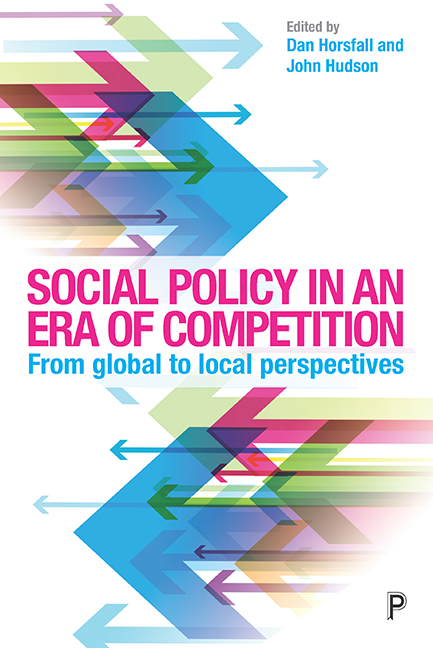Book contents
- Frontmatter
- Contents
- List of figures, tables and boxes
- List of contributors
- List of abbreviations
- Introduction: social policy in an era of competition
- Part One Global competition as the context for welfare
- Part Two The impact of intensifed competition on local governance
- Part Three The reframing of welfare discourses in an era of competition
- Part Four Conclusions
- References
- Index
seven - Global competitiveness and the rescaling of welfare: rescaling downwards while competing outwards?
Published online by Cambridge University Press: 05 April 2022
- Frontmatter
- Contents
- List of figures, tables and boxes
- List of contributors
- List of abbreviations
- Introduction: social policy in an era of competition
- Part One Global competition as the context for welfare
- Part Two The impact of intensifed competition on local governance
- Part Three The reframing of welfare discourses in an era of competition
- Part Four Conclusions
- References
- Index
Summary
Rescaling welfare in an era of global competition
Scholars have tended to assume that social policies are national policies (Kazepov, 2010, p 35), with comparisons of national data dominating comparative analyses of welfare. This seems natural, since the ‘welfare state’ developed historically and conceptually within the frame of the ‘nation-state’, with policies ‘characterised by a collective management of individual standardised risks’ (Kazepov, 2010, p 42). States became the world's ‘social containers’, each national population being treated as ‘a cohesive social grouping that constituted a moral and practical social system’ (Taylor, 1994, p 156). As Keating (2009, pp 268–9) observes, T.H. Marshall's (1992) famous account of the development of citizenship, culminating with welfare states rooted in ‘social citizenship’, takes for granted that the nation-state is synonymous with the political, legal and social community.
Yet globalisation challenges some of these assumptions. The competition state thesis provides a nuanced account of the adaption of the welfare functions of the state in the face of intensified global competition, whereby the state has been reconfigured to sit at the ‘crossroads’ of global governance, transmitting the market discipline of the global capitalist economy within the borders of the national state (Cerny, 1997; 2010). A number of authors have observed the ways in which nation-states are increasingly enmeshed within more complex governance structures, ceding powers both ‘upwards’ to supranational institutions and ‘downwards’ to subnational levels of organisation (Hirst and Thompson, 1999). Pauly and Grande (2005, p 4) have observed the manner in which governance structures at all levels are becoming increasingly complex, leading to ‘multiple and overlapping hierarchies’. While states are now routinely enmeshed in a range of international and supranational organisations ‘above’ them, they may also have various incentives to loosen controls over subnational units of governance or areas of territory within or ‘below’ the state as a whole.
Keating (2001, p 53) highlights various strategies states that have traditionally used for managing their territories such that the competing claims of different populations and areas could be reconciled and the state's overall territorial integrity maintained.
- Type
- Chapter
- Information
- Social Policy in an Era of CompetitionFrom Global to Local Perspectives, pp. 117 - 132Publisher: Bristol University PressPrint publication year: 2017



